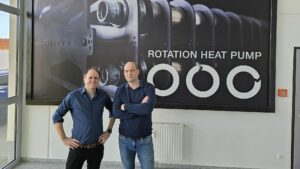EU Industry Days 2021: The Curious Case of Bulgaria’s Energy Heart and Its Road to Zero-Carbon

Stara Zagora, Bulgaria’s sixth-largest city, is one of the heaviest coal-dependent regions in Europe. For many years, the energy sector has been and remains a huge contributor to the local economy. This is about to change with the goals for a carbon-free energy future of the EU. Can Bulgaria and other EU regions make the leap from fossil fuels to renewable energy? A local event, part of the EU Industry Days 2021*, aims to find out.
A small coal region in the big picture of sustainable future
Stara Zagora is known as the energy hub of Bulgaria. And for a good reason – the central Bulgarian city is home to the three biggest power plants in the country – Maritza Iztok 1 (TPS AES Galabovo), Martiza Iztok 2, and Maritza Iztok 3 that use coal for energy production and have been a key part of the economic stability of the “Center of the Universe” (as locals call Stara Zagora with a slight wink) for quite some time. They concentrate about 85% of jobs (over 12,500 people) in Bulgaria’s coal sector and secure a pretty decent living for some 30% of the local workforce.
However, clouds of insecurity are piling ahead for Stara Zagora and the other coal regions in the EU as the bloc’s green policies and measures gain momentum.
Time for a change – challenges and opportunities
As part of its Green Deal, The EU has pledged to go climate-neutral by 2050, and the transition to clean energy is one of the cornerstones of this plan. The question is how and is there a plan for helping local economies mitigate the expected transitional impact in the form of job losses, a temporary decline in economic activity, and lower living standards?
According to estimates announced by Vladimir Danailov, CEO of the Bulgarian Fund of Funds as part of the Industry Days 2021, the transition to clean energy will affect and threaten the jobs of more than 60,000 people that work either in power plants or coal mines in Stara Zagora, Pernik, and Kyustendil.
“Change needs to be communicated in the right way,” he pointed out. “It’s good that we have a transition mechanism in place, which is going to support the process, but we also need to be coherent in terms of communication with the local people, with the local business, and be proactive in embracing the change and supporting the creation of new industries in Stara Zagora.”
The challenges involving the transfer to a carbon-neutral economy open up “opportunities for new investments,” panelist Dr. Rumyana Grozeva, Executive Director of the Stara Zagora Regional and Economic Development Agency (SZ REDA), told Trending Topics SEE. “For sure, the region has a huge potential and at least two main economic sectors for further sustainable development: clean energy +related economic sectors and biotechnologies,’ she added.
Money talk
To support member-states in the joint zero-carbon effort, the EU has set in place several financing mechanisms and programs, including the so-called Just Transition Fund. Under the mechanism, Stara Zagora along with Pernik and Kyustendil, two other Bulgarian cities that are heavily dependent on the coal industry, will get EUR 1.2 billion with Stara Zagora entitled 70% of this amount. “But receiving the funding is strictly related to well-prepared and justified projects that meet the Just Transition Fund criteria,” warned Grozeva.
EU funding is not the only option. The Fund of Funds, as the Fund Manager of the Financial Instruments in Bulgaria, is known, has already structured some tools. “We want Stara Zagora to have companies are probably going to be very innovative companies and probably the only way for them to be supported financially through different financial instruments as banks are not always willing and actually able to provide financing for such endeavors,” said the Fund’s CEO Vladimir Danailov.
“Financial instruments are a very good way to maximize the impact of the grant funding by mobilizing private sector resources in order to reach more final beneficiaries and to be able to cover a larger scope of activities and investments much needed in regions like Stara Zagora. This is the only way in fact if we want to reach all these targets and goals and at the same time make sure we have a Just Transition for the regions, business, and the economies,” added Lilyana Pavlova, EIB Vice President.
„The challenge is to make sure that the money gets to the people – businesses and workers, as quickly as possible but also that the money gets to those people that need it the most and that the right policies and measures are put in place to make sure that the transition is a success and all of us live better lives in the end,” said Mr. Cvetan Kyulanov, acting Head of the European Commission Representation in Bulgaria.
First steps on road to transition
Projects identification and partnership to meet the Just Transition Fund criteria are still in the early stages, said SZ REDA’s Grozeva. “This doesn’t mean that Stara Zagora has been doing nothing in terms of planning its economic diversification and sustainable growth,” she added, citing the Zagore Industrial Zone as a very good example of initiatives in the area. The zone was established in consultations between the local authorities and the business of the Stara Zagora. Funding provided as part of the Just Transition fund will allow investments there to be tripled, which in turn will help meet investor needs in terms of staff re-skilling, process digitization, R&D infrastructure, etc.
Stara Zagora is also on its way to building a virtual reality lab to upgrade the country’s first Digital Innovation Hub. The project, implemented in partnership with the Zagore Industrial Zone, will pave the way for Bulgaria’s transition to the fourth industrial revolution and the new, emerging technologies it involves. Easier access to research and development infrastructure will facilitate investments in information and communication technology and other high-value-added industrial sectors. It will also attract investments for the construction of manufacturing plants, warehouses, and logistics facilities.
*EU Industry Days is Europe’s flagship annual event on industry. It serves as the main platform to discuss industrial challenges and co-develop opportunities and policy responses in an inclusive dialogue with a wide range of partners. This is done via local events that take on these challenges, such as the one in Stara Zagora dedicated to “Digitalization for carbon-neutral transformation”. EU Industry Days 2021 took place as a virtual event from 23 – 26 February.




























